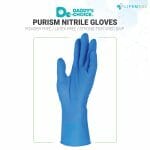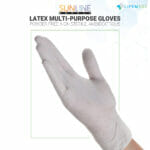Not sure which type of glove is right for you – nitrile or vinyl? In this article, we will compare these two types of gloves, covering their benefits, drawbacks, and preferred uses.
What are Nitrile Gloves Made From?
Nitrile gloves are gloves made from nitrile butadiene rubber, a synthetic rubber. They offer resistance to a variety of chemicals and are available in a range of colors, sizes, and thicknesses for a variety of uses. Invented in the 1960s, nitrile gloves have become increasingly popular in recent years as a latex-free alternative to latex gloves.
What are Vinyl Gloves Made From?
Vinyl gloves have been around since the 1950s and are made from PVC (polyvinyl chloride). They were invented specifically for light-duty tasks that don’t require a lot of precision or dexterity. They are available in clear and powder-free varieties.
What are Nitrile and Vinyl Gloves Used For?
Though they are different, nitrile & vinyl gloves are often used in similar or the same industries, such as:
- Food preparation & service
- Beauty & hair salons
- Janitorial & Housekeeping
- Health care & senior care
- Childcare
- Manufacturing & Automotive
Despite their frequent association with one another, certain situations are more suited to them than others.
In the Food Preparation Industry
Vinyl gloves are a popular choice in the food preparation industry because they provide a good grip and are resistant to oils. They are also relatively inexpensive and disposable, which is important in a high-turnover industry. However, vinyl gloves are not as durable as nitrile gloves and they provide less protection against chemicals so they are not the best choice for handling raw meat or poultry.
In the Beauty Industry
In the beauty industry, nitrile gloves are often the preferred choice because they provide a good grip and are resistant to chemicals. Hair Stylists may use nitrile gloves when coloring hair to avoid staining their hands, and manicurists may use them when working with acetone or other chemicals. Vinyl gloves may be used for tasks that don’t require precision, like shampooing hair.
In the Janitorial/Housekeeping Industry
Vinyl gloves are often used in the janitorial and housekeeping industry because they are inexpensive and disposable. They provide a good grip when cleaning, but nitrile gloves are a better choice when it comes to handling chemicals and cleaning up spills.
In the Healthcare Industry
In the healthcare industry, nitrile gloves are the preferred choice because they provide more protection against chemicals and viruses for both patients and healthcare workers. Vinyl gloves are not as durable as nitrile gloves so they are not a good choice for tasks that require a lot of precision or dexterity. Surgeons, for example, prefer nitrile gloves for obvious reasons and nurses may prefer vinyl gloves because they are less expensive and more disposable. In senior care, nitrile gloves are also the preferred choice for the same reasons.
In the Childcare Industry
In the childcare industry, nitrile gloves are typically the preferred choice because they provide more protection against chemicals and viruses. Children are often more susceptible to getting sick, so it’s important to choose gloves that will provide the best protection against germs. Often chemicals such as cleaners are used in childcare facilities, so nitrile gloves are a good choice for protecting both children and childcare workers from potential chemical harm. Children are also more likely to have latex allergies, so nitrile gloves are a good latex-free alternative.
In the Manufacturing & Automotive Industry
In the manufacturing and automotive industry, nitrile gloves are often preferred for their grip and resistance to chemicals. They are also more durable than vinyl gloves so they can stand up to tasks that require a lot of precision or dexterity such as working with small parts. However, vinyl gloves may still come into play when it comes to tasks that don’t require precision, like wiping down surfaces.
Overall, nitrile gloves are better in situations where you need a stronger, more durable glove as they are three times more puncture resistant than vinyl gloves. They provide excellent resistance to chemicals, oils, and greases, making them ideal for use in the automotive or manufacturing industries. Vinyl gloves are a good choice for tasks that don’t require as much dexterity or precision and are less expensive – perfect for situations where they need to be disposed of frequently.
BPA in Nitrile and Vinyl Gloves
BPA (bisphenol A) is a synthetic compound found in certain plastics and resins. It has been linked to a variety of health concerns, including cancer and infertility. Some nitrile and vinyl gloves are made with BPA, though manufacturers are increasingly using BPA-free alternatives. When choosing nitrile or vinyl gloves, be sure to check the packaging to see if BPA is listed as an ingredient.
Environmental Impact
Another factor to consider when choosing nitrile or vinyl gloves is the environmental impact.
Nitrile gloves are made from synthetic rubber, meaning they are not biodegradable. Vinyl gloves, on the other hand, are made from PVC which is a recyclable material. To dispose of nitrile gloves, they must be sent to a landfill where they will take up space and potentially release harmful chemicals into the environment. Vinyl gloves can be recycled, meaning they have a smaller environmental impact. Even so, both nitrile and vinyl gloves have a large carbon footprint due to the energy and resources required to produce them.
Shelf Life
Nitrile gloves have a shelf life of about five years, while vinyl gloves only last for two years. This is due to the fact that nitrile gloves are made from synthetic rubber, which is more durable than PVC.
In conclusion
Overall, your choice between vinyl vs nitrile gloves will depend on what you’re looking for when it comes to factors like cost, durability, precision, and environmental impact.


















